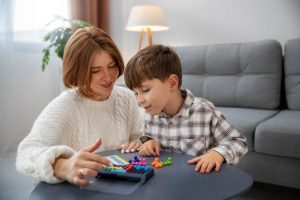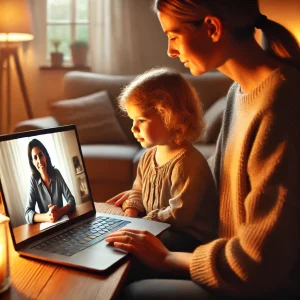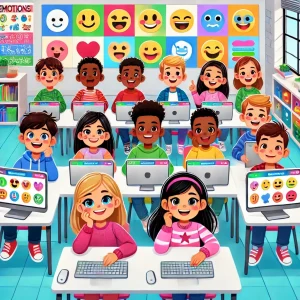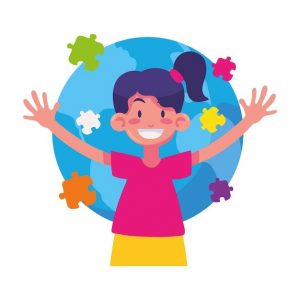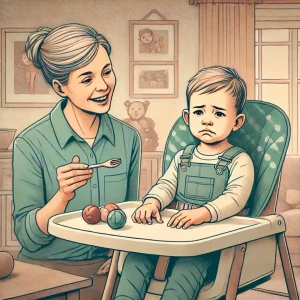Online Counseling for Kids: Managing Emotional Outbursts
Last Updated: August 23, 2024
In today’s fast-paced world, children face a growing number of emotional challenges. From academic pressures to social dynamics, kids are navigating complex situations that can lead to heightened stress and emotional outbursts. These outbursts, while natural, can become overwhelming for both the child and the parent, affecting a child’s overall well-being.
This is where online counseling steps in as a modern solution. With the rise of digital platforms, children now have access to professional help from the comfort of their homes. Online counseling provides a safe space where kids can express their feelings, learn to manage their emotions, and develop healthier coping mechanisms.
Understanding Emotional Outbursts in Kids
Emotional outbursts are intense reactions that children have when their emotions become too overwhelming to manage. These outbursts, often characterized by crying, yelling, or tantrums, are a child’s way of expressing feelings that they may not fully understand or know how to control. While emotional outbursts are a natural part of growing up, frequent or severe episodes can be a sign that a child is struggling to cope with underlying stress or frustration.
There are several common triggers for emotional outbursts in children. Stress, whether from schoolwork, social situations, or family dynamics, can easily push a child to their emotional limits. Frustration is another significant factor—when kids feel they aren’t being understood or their needs aren’t being met, they may resort to outbursts as a way to communicate their distress. Unmet needs, such as hunger, fatigue, or the need for attention, can also play a major role in these emotional episodes.
When left unmanaged, these outbursts can have a lasting impact on a child’s well-being and development. Children who frequently experience intense emotions may struggle with self-esteem issues, find it hard to build positive relationships, or develop behavioral problems. Over time, these challenges can affect their academic performance, social interactions, and overall mental health. This is why understanding and addressing the root causes of emotional outbursts is so important for fostering a child’s emotional growth and resilience.
The Role of Online Counseling in Managing Emotional Outbursts
Online counseling has emerged as a valuable tool for helping children navigate their emotions, particularly when it comes to managing emotional outbursts. But how does it work, and why is it so effective for kids?
1. Overview of Online Counseling for Kids
Online counseling provides children with access to professional therapists through digital platforms. Sessions are conducted via video calls, chat, or other interactive tools, allowing children to receive support without needing to leave their homes. This approach is particularly beneficial for kids who might feel anxious about traditional in-person therapy settings. The familiarity of their home environment helps them feel more at ease, which in turn makes it easier for them to open up about their feelings.
2. Benefits of Online Counseling for Emotional Regulation
One of the biggest advantages of online counseling is its accessibility. Regardless of location, children can connect with skilled therapists who specialize in emotional regulation. This accessibility ensures that more children can receive the help they need, especially those living in areas with limited access to mental health services.
Additionally, online counseling offers a level of comfort that is unique to the digital space. Children can engage in therapy from a place where they feel safe, which significantly reduces the stress often associated with face-to-face sessions. This comfort allows for a more tailored approach to therapy, where techniques and strategies can be adjusted to suit the child’s specific needs, ultimately leading to better emotional regulation.
3. Creating a Safe Space for Expression
Online therapy also creates a safe and supportive environment for children to express their emotions. The privacy and security provided by these platforms encourage kids to share their feelings without fear of judgment. This safe space is crucial for helping children learn to manage their emotions. They can explore their thoughts and feelings with guidance from a therapist, developing the skills they need to handle emotional outbursts more effectively.
Effective Strategies Used in Online Counseling
When it comes to helping children manage emotional outbursts, online counseling employs a variety of effective strategies. These approaches are designed to help kids understand their emotions, develop coping skills, and build emotional resilience.
1. Cognitive-Behavioral Techniques
One of the most widely used methods in online counseling is Cognitive-Behavioral Therapy (CBT). CBT helps children identify and change negative thought patterns that lead to emotional outbursts. By understanding the connection between their thoughts, feelings, and behaviors, kids can learn to manage their emotions more effectively. For example, a child might learn to recognize the early signs of frustration and use calming techniques to prevent an outburst.
2. Interactive Tools and Activities
Online counseling often incorporates interactive tools and activities that engage children in the therapy process. These tools, such as digital games, visual aids, and story-based exercises, make therapy sessions more engaging and fun for kids. By participating in these activities, children can learn new ways to express their feelings and practice self-regulation in a way that feels natural and enjoyable.
3. Role-Playing and Scenario-Based Learning
Role-playing is another powerful technique used in online counseling for kids. Through role-playing, children can practice different scenarios that may trigger emotional outbursts. By acting out these situations in a safe and supportive environment, kids can explore alternative responses and develop better coping strategies. For instance, a child might role-play how to calmly express their needs when feeling frustrated instead of resorting to an outburst.
4. Involvement of Parents for Holistic Support
Parental involvement is crucial in the online counseling process. Counselors often work closely with parents to ensure that the strategies being taught in sessions are reinforced at home. Parents are guided on how to support their child’s emotional development, creating a consistent approach that helps the child feel secure and understood. This holistic support system is key to achieving lasting change.
5. Use of Emotional Self-Regulation
Teaching children emotional self-regulation is a central focus of online counseling for kids. Kids learn techniques such as deep breathing, mindfulness, and positive visualization to help them stay calm and centered during challenging moments. By mastering these skills, children gain greater control over their emotions, reducing the frequency and intensity of outbursts.
Techniques for Managing Emotional Outbursts
| Technique | Purpose | Example | How It Helps |
|---|---|---|---|
| Cognitive-Behavioral Therapy (CBT) | Change negative thought patterns and behaviors | Identifying and reframing thoughts: For example, helping a child replace “I can’t do this” with “I can try my best.” | Helps children recognize and alter unhelpful thoughts that lead to emotional outbursts. |
| Deep Breathing | Helps calm and focus the child during emotional distress | 4-7-8 Breathing Technique: Inhale for 4 seconds, hold for 7 seconds, and exhale for 8 seconds. | Reduces stress and promotes relaxation, making it easier for kids to manage emotions. |
| Role-Playing | Practice responses in a safe and controlled environment | Acting out scenarios like calmly asking for help when frustrated instead of crying or yelling. | Teaches children how to respond appropriately in real-life situations, reducing outbursts. |
| Parental Involvement | Reinforce and support counseling techniques at home | Regular check-ins and using the same language and strategies discussed in therapy sessions. | Ensures consistency in the child’s environment, reinforcing the progress made during therapy. |
| Emotional Self-Regulation | Build skills for managing emotions independently | Teaching children to recognize when they are getting upset and use a coping strategy like counting to 10. | Empowers children to take control of their emotions, reducing the frequency of outbursts. |
The Benefits of Online Counseling for Emotional Management
Online counseling for kids offers numerous long-term benefits when it comes to managing emotional outbursts. These benefits extend far beyond immediate relief, helping kids develop essential life skills that will serve them well into adulthood.
1. Long-Term Benefits of Managing Emotional Outbursts
One of the key advantages of online counseling is its ability to address the root causes of emotional outbursts, rather than just treating the symptoms. Over time, children learn to recognize their triggers and respond in healthier ways, leading to fewer and less intense outbursts. This long-term approach helps create lasting behavioral changes that benefit children as they grow and face new challenges.
2. Improvement in Communication Skills and Emotional Intelligence
Through online counseling, children develop better communication skills. They learn to express their feelings more clearly and confidently, reducing the frustration that often leads to outbursts. Additionally, counseling helps kids build emotional intelligence—the ability to understand and manage their own emotions while also empathizing with others. These skills are crucial for forming positive relationships and navigating social situations.
3. Enhanced Self-Regulation and Reduced Frequency of Emotional Outbursts
A significant focus of online counseling is teaching children self-regulation techniques. By learning strategies like deep breathing, mindfulness, and positive self-talk, kids gain greater control over their reactions. As they become more adept at managing their emotions, the frequency and intensity of emotional outbursts decrease. This improved self-regulation also helps children feel more in control, boosting their overall well-being.
4. Building Resilience and Confidence in Kids to Handle Challenges
Perhaps one of the most valuable outcomes of online counseling is the development of resilience. Children who participate in counseling learn how to face difficulties with confidence and a positive mindset. This resilience not only helps them handle emotional challenges but also prepares them to tackle other obstacles in life. As they build confidence in their ability to manage their emotions, kids become more adaptable and capable, leading to greater success in both academic and social environments.
Tips for Parents to Support Their Kids
As a parent, you play a crucial role in reinforcing the techniques your child learns during online counseling. By taking an active part in their emotional growth, you can help ensure that the benefits of therapy extend beyond the sessions. Here are some practical tips to support your child at home:
1. Reinforce Counseling Techniques at Home
The strategies your child learns during online counseling can be most effective when practiced consistently. Work with your child’s counselor to understand the techniques they are using, such as deep breathing exercises, positive self-talk, or mindfulness activities. Incorporate these practices into your daily routine to help your child develop healthy habits. For example, if your child is learning to manage frustration through breathing exercises, you can gently remind them to use these techniques when they start to feel upset.
2. Encourage Open Communication and Emotional Expression
Creating an environment where your child feels safe to express their emotions is vital. Encourage them to talk about their feelings and listen without judgment. Ask open-ended questions like, “How did that make you feel?” or “What can we do to make things better?” This kind of open communication not only strengthens your relationship but also reinforces the idea that it’s okay to express emotions in a healthy way. Remember, the goal is to make your child feel heard and understood, which can significantly reduce the likelihood of emotional outbursts.
3. Monitor Progress and Stay Involved
It’s important to stay involved in your child’s emotional journey by monitoring their progress. Regularly check in with your child and their counselor to discuss how things are going. Celebrate small victories and improvements, whether it’s fewer outbursts, better communication, or increased self-regulation. Staying engaged in the process shows your child that you’re there to support them every step of the way. Additionally, being involved helps you identify any areas where further support might be needed, ensuring that your child continues to thrive.
Conclusion
Helping children manage emotional outbursts is essential for their overall growth and happiness. When these outbursts are not addressed, they can lead to difficulties in communication, self-control, and social interactions. By understanding the causes and teaching kids how to cope, parents can guide their children toward better emotional health.
Online counseling is a great tool for this. It allows children to receive support in a comfortable environment, with techniques that suit their needs. The flexibility and personalized approach of online therapy make it a strong option for helping kids manage their emotions. If you’re considering ways to support your child’s emotional development, exploring online counseling could be a helpful next step.
Frequently Asked Questions:
1. How does online counseling help children manage emotional outbursts?
Online counseling helps children manage emotional outbursts by providing them with tailored strategies and techniques to recognize and control their emotions. Through interactive sessions, kids learn to express their feelings in a healthy way and develop better coping skills.
2. What are the benefits of online counseling for kids with frequent emotional outbursts?
The benefits of online counseling for kids include improved emotional regulation, better communication skills, enhanced self-confidence, and the ability to handle challenges more effectively. It also offers the convenience of accessing therapy from the comfort of home, making it easier for children to engage.
3. Can online counseling be as effective as in-person therapy for kids?
Yes, online counseling can be just as effective as in-person therapy for many children. The key is to use engaging tools and activities that capture the child’s interest while also addressing their emotional needs. It’s especially beneficial for kids who feel more comfortable in a familiar environment.
4. What challenges might parents face with online counseling for their children?
Parents might face challenges such as screen fatigue, technical issues, or difficulties in maintaining a strong connection between the child and the counselor. However, these challenges can be managed with proper planning, reliable technology, and strategies that keep the child engaged.
5. How can parents support their child’s progress in online counseling?
Parents can support their child’s progress by reinforcing counseling techniques at home, encouraging open communication, and staying actively involved in their child’s emotional growth. Regular check-ins with the counselor can also help track progress and make necessary adjustments.
6. Is online counseling safe and secure for children?
Yes, online counseling platforms are designed to be safe and secure, ensuring that the child’s privacy is protected. Parents should choose a reputable service that uses secure, encrypted communication channels to keep all sessions confidential.
7. What should I look for when choosing an online counselor for my child?
When choosing an online counselor, look for professionals with experience in child therapy, a strong understanding of emotional regulation techniques, and positive reviews from other parents. It’s also important to ensure that the counselor is licensed and has experience with online therapy.
8. How long does it take for online counseling to show results in managing emotional outbursts?
The time it takes for online counseling to show results can vary depending on the child and the specific issues being addressed. However, many children start to see improvements in emotional regulation and reduced outbursts within a few weeks of consistent therapy sessions.
9. What age group is most suitable for online counseling to manage emotional outbursts?
Online counseling can be effective for children of various age groups, typically starting from around age 5 and up. The suitability depends on the child’s ability to engage with digital tools and their comfort level in a virtual setting. Counselors often tailor their approaches based on the child’s age and developmental stage.
10. Can online counseling help children with other behavioral issues besides emotional outbursts?
Yes, online counseling can help children with a range of behavioral issues, including anxiety, ADHD, social challenges, and more. The techniques used in online therapy, such as cognitive-behavioral therapy (CBT) and mindfulness, can be applied to various emotional and behavioral concerns.
About Author:
Lasya Vooturi,
Clinical Psychologist (A) & Behavioral Therapist
Lasya holds a Professional Diploma in Clinical Psychology from Amity University, where she deepened her understanding of psychological principles from March 2023 to March 2024. With over a year of dedicated experience as a Behavioral Therapist, Lasya has honed her skills in applying effective therapy techniques tailored to individual needs. Fluent in Telugu, Hindi, and English, she is adept at connecting with a diverse range of clients, ensuring comprehensive communication and understanding. Lasya’s approach is grounded in empathy and scientific rigor, making her a trusted ally in navigating mental health challenges.
Book your Free Consultation Today
Parent/Caregiver Info:
Client’s Details:
* Error Message
